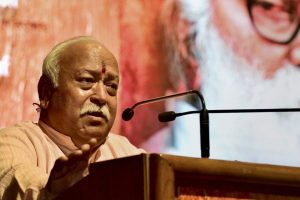RSS Chief Mohan Bhagwat speaking during the conference in Delhi University
Article: https://thewire.in/119147/rss-du-workshop-indian-values/
In a conference organized by the RSS (a right-wing Hindu volunteer organization linked to the ruling party of India) at the Delhi University and attended by over 700 academics from universities across the country, one of the discussion topic was about how to instill “a true nationalist narrative in [India’s] educational system”, “reach out to students with an Indianized form of educational content”. Some conference participants believe that the content taught in Indian university “is all about the west” and fails to teach students the achievements and contributions of Indians to the world.
From your personal experience or otherwise, do you agree that university curriculums or the teaching of academics in higher education tend to be overly western-centric? In fact, recently, there was a campaign by students from London’s School of Oriental and African Studies to “decolonize the curriculum”[1] as they claimed that white/western philosophers and their theories/view dominated what is being taught at the university. If intellectual diversity along cultural lines is desirable, how can we ensure this in universities?
The article also raises the larger question on the purpose of education, especially from the perspective of the government. Do you agree that universities should play a role in fostering nationalism strengthening the sense of national identity? If so, what about foreign students in the universities? Has your country tried to “nationalize” the higher education curriculum in any way?
[1] See: http://www.independent.co.uk/news/uk/home-news/soas-university-of-london-students-union-white-philosophers-curriculum-syllabus-a7515716.html, https://www.soas.ac.uk/blogs/study/decolonising-curriculum-whats-the-fuss/, https://www.theguardian.com/commentisfree/2017/jan/10/soas-students-study-philosophy-africa-asia-european-pc-snowflakes

One thing we see that Chinese Universities is working on is to increase international collaboration. A recent news in Chines media sponsored an discussion on admission of international students. Many international students who wish to apply chinese university are not real “foreigner” but children grow up in China with a different country’s identity. I think these discussions suggest that there is a long way and many more obstacle chinese university would face proceeding international collaboration.
There is definitely an inclination towards maintaining a nationalized curriculum ( in related disciplines i.e. history ) in public universities in Pakistan. However, as mentioned earlier, the quality of education is not very high at these institutes, so updating the curriculum (whether to inform nationalistic discourse or ensure the country’s participation in the knowledge economy/society ) or improving the quality of the the higher education system in general is not a priority. The amount of international students again is negligible (there is a small proportion of students who come from the Middle East and Africa to study in Pakistan) which is not factored in during decisions by the faculty/ Higher Education Commission on the curricula.
Unlike K-12 education, since universities should be given an academic freedom, the government should not intervene the contents of education at universities. This idea is especially important when a country wants to increase universities’ international rankings in terms of gathering international students. If the Indian government make universities more “Indianised,” the government can subsidize to the universities that offer “Indianised” education instead of enforcing them to change their curriculum.
This pair of articles certainly raise a lot of issues.
I don’t think governments should have the power to enforce that universities instill a “true nationalist narrative.” I believe a certain amount of nationalism is expected, if not respectable, but there are historical examples of when nationalism has gone very wrong. If universities want to do that on their own, then that’s another issue. In this case, students would technically have the choice to attend the school or not. In the case of India, it sounds like they just want to develop a system that works for them.
The curriculum issues that are brought up in India and SOAS sort of make me wonder what the big deal is. I can certainly understand perhaps “toning down” the Western narrative, but why not simply inject more diverse material into the course syllabus that can be criticized and compared or develop new classes that focus purely on India’s contributions or on the great thinkers from Africa and Asia? Furthermore, a statement in the India article confounds me a little bit: “We are not teaching our students the contributions of Indians in science.” Why not include these scientists in the curriculum? Is there really a need for an overhaul? Also, technically, what does it matter? Why not just teach science? Why does it matter where the scientists are from?
Thanks, Alicia. It’s a very interesting topic. I think Chinese universities also the same problem when we learn a lot from US experience. The culture and tradition background and the political system are different. It is actually very hard for Chinese universities to understand or implement the core values o Western models such as academic freedom and institutional autonomy. In the present great leap forward in Chinese higher education, what is missing is attention to cultural and institutional values. That’s why now in China, the government emphasizes a lot on the study of Chinese traditional cultures. If Chinese universities cannot successfully integrate Chinese and Western values, the promise of the modern university in China will be limited. The question of culture is part of a much wider and more complex process
of seeking an alternative to Western globalization. To be truly “world-class,” Chinese universities must find an appropriate or uniquely Chinese way
to balance indigenous and Western ideas of the university. I bet it’s the same picture for a lot of Asian countries.